On the BrotherBored Patreon, fans submit ideas for articles and help me choose which topic I’ll write about next!
The most recent winning topic was:
BrotherBored, you referenced a diplomatic strategy where you treat all the other players as your ally right up until the moment where you attack a particular player. Please explain this technique.
This is a great suggestion! Indeed,I’ve been planning to write on this topic for a long time. I alluded to this strategy in my previous Solo Win Tip article, Embrace the Powers’ Differences:
My favorite way to play Germany—one that I’ve been very successful with historically—is to do everything I can to convince each of my neighbors that they are my “main” ally, and that my alliances with my other neighbors are just temporary. There’s nothing that any of them would hear from each other that is inconsistent with the narrative I’ve given each player: “Yes, I am allied to that other power, and I’ve said to them that the alliance could be long term, but that’s not my true intention.” In reality, none of my allies is my “main” ally. My strategic plan is to see how the match plays out and attack the rival that seems the most advantageous to attack down the road. But regardless of who I ultimately attack, that attack was “expected”—and almost always, welcomed!—by my other allies.
Your Bored Brother
As I explained in the previous piece, I believe that going all-in on this play style matches up well with Germany.[1]Germany’s unique position of having 5 neighbors gives Germany both the incentive and the means to look for multiple overlapping alliances. However, any of the powers might benefit from pursuing a version of this diplomatic approach.
To win a match of Diplomacy, you typically need at least one “ally.”[2]I use scare quotes here because I have cautioned against thinking of your rivals as truly “allied” to you just because they are cooperating with you. Usually—and especially early in the match—more allies is better. But it isn’t possible to grow (let alone win!) while allied to everybody. If you’re going to win, you’ll eventually have to attack another player, and you’ll eventually have to attack former allies. You know this, they know this, everybody knows this. Thus, pursing multiple alliances beyond the first few years has the potential to be “too much of a good thing” and backfire. The mystery surrounding your true intentions can undermine the trust you seek from your allies, counteracting the benefit of having an alliance in the first place.
It’s a conundrum, isn’t it? How can you cooperate with one ally without estranging the other? How can you have your cake and eat it too?
Your Bored Brother knows a technique that makes this possible. I call it…
Make Friends, then Choose Enemies
The name of the game right there. You can definitely win games where your enemies are chosen for you, but it’s much harder than doing so in games where you do the choosing. And you can’t make informed choices of enemies without making friends across the board first. I can tell that’s gonna be a great one.
Eden (guest writer at BrotherBored), upon learning the title of this article.
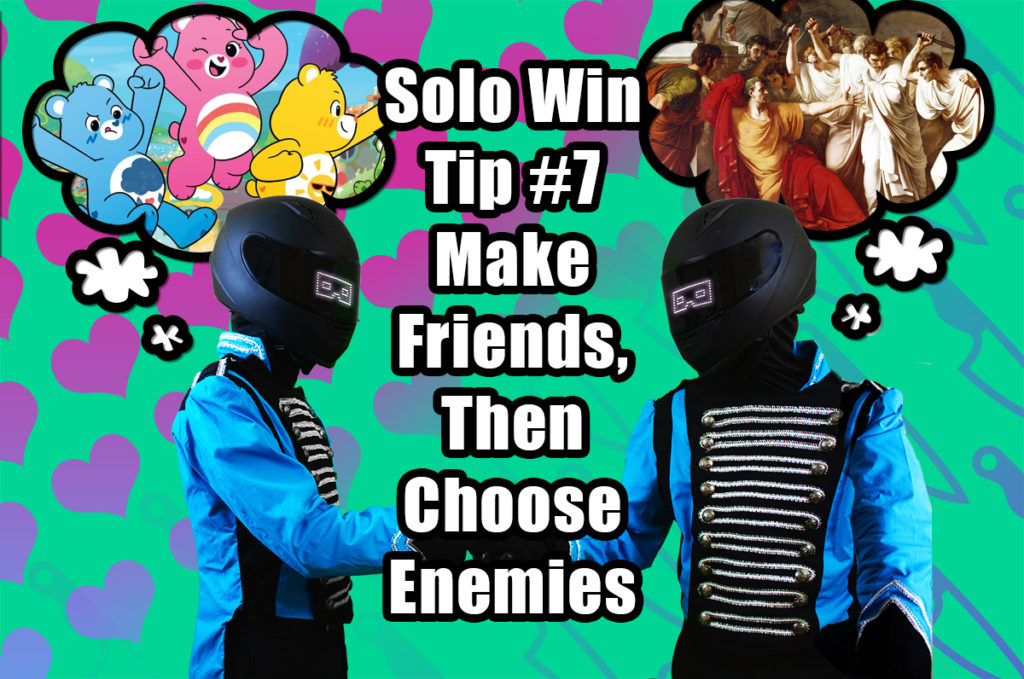
Here’s what to do:
Simultaneously pursue a close alliance with at least two other powers. If you find it prudent to explain to one of your allies why you are cooperating with the other player, tell that ally the cooperation is a temporary expediency—or even that you are faking an alliance with that player!

Most players—especially one with whom you have developed a close relationship—will be impressed with such a far-sighted ploy and won’t be worried if they already trust you. And because you have told this player you are faking an alliance, there’s pretty much nothing they could hear from another source that is inconsistent with what you have said. You’ve already admitted to developing a relationship with that power, and constructed a narrative as to why that other relationship isn’t a danger.
If you have a strong relationship with each of those players, if each believes that you are “faking” your other alliance, then you are free to choose who to attack later on. Choose your enemy based on what makes strategic sense for you later in the match. Backstab that player and vindicate your promise to your “true ally.”
Sounds simple, right? Well…it is! But a simple plan can be challenging to execute.
Before I talk about how to pull this off (and how to counter it), let’s first talk about why it is worth the effort!
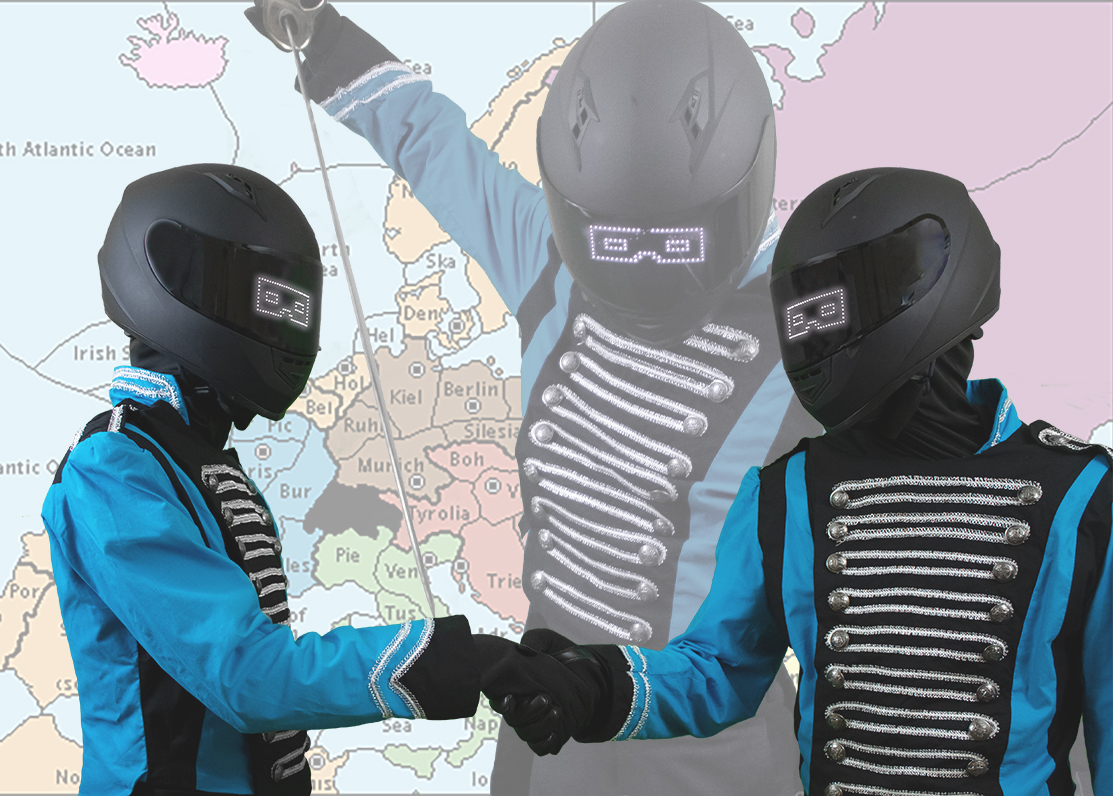
What makes the technique powerful?
1. You maximize the value of your “diplomacy.”
Succeeding with this technique is at the acme of diplomatic excellence. Every rival converted to an ally is one danger mitigated. The more players talking to you, the greater your knowledge of (and influence upon) events all over the board. It’s hard to lose in this situation.
2. Opportunities may fall into your lap.
A flexible strategic posture permits you to choose the route most likely to result in your solo win after you have watched the game develop.
3. You can look before you leap.
As the turns go by, you will gain greater and greater knowledge of your rivals. Carefully choosing who to attack (and when) does wonders for improving your chances of a solo win. The ideal ally to take with you into the endgame is one who, by naïveté, loyalty, or some other factor, will neither foresee nor correctly block your solo win attempt—but it can take a long time to figure out who that might be!
4. Your rivals, smothered with your love, may neglect each other.
Most players don’t use this technique, and so they won’t make the effort to develop multiple deep alliances. So once a player decides that they’re committed to working with you as their ally, they may neglect their relationships with the other powers. After all, a player only has so much time to think and respond to the press they receive. In other words, most players’ ability to pursue alliance play is a limited resource that you can use up by acting as their main ally. Thus, this technique diminishes the chances of rival alliances forming against you. Ideally, the ally that you ultimately backstab has so neglected their other relationships that they don’t have the diplomatic clout to rally anybody to help pull the dagger from their back.

5. This technique is difficult to detect or to counter.
Whichever player you decide keep around as your ally, that player can conclude that they were your “true ally” the entire time—exactly as your told them! Your “true ally” will feel pleased that their trust in you has been rewarded, and may even feel some schadenfreude towards your “fake ally” that they helped you prepare to stab. Even if your rivals share notes with each other, they won’t learn anything; you already told each player to expect you to be faking an alliance! You only ever “lied” to the victim of your backstab. From the perspective of your “true ally,” you honored your promise.

An added bonus is that by holding back your decision on whom to backstab, you reduce the chances that you will unconsciously give away your intentions (and be detected by someone’s backstab Spider Sense). You can’t give away intentions you don’t have.
The worst that can happen is your allies compare notes and realize what you are trying to do. But that’s certainly no disaster, and is unlikely to backfire. Even when your rivals suspect what you are doing…that doesn’t automatically mean they both change sides and attack you. Most Diplomacy players understand that their rival players are (by degrees) hedging their diplomatic options, and won’t hold it against you that you are trying to keep your options open. They may even respect your panache!
And in my experience, what most commonly happens when these allies become worried that you may not be as committed to the alliance as they previous hoped…is that one or both increases their effort to draw you in to the alliance! They will say something like “Hey, I realize that in a few turns you get to decide whether to continue working with me or with so-and-so. Here’s why I think it should be me you work with…” If a player genuinely likes you and wants to work with you, that is unlikely to change.
6. Paradoxically, your allies may trust you more.
The ally you end up betraying will be bitter, but if they placed their trust you, you should be able to set up a devastating backstab from which they won’t recover. So, who cares?
What about the risk to your overall credibility? It’s strange—even counter-intuitive—but actually, you stand just as much chance to increase your credibility as to diminish it. Let me explain.
If we’re thinking objectively here, shouldn’t the fact that you lied through your teeth to your victim be some evidence that you’re just not to be trusted in general? Won’t your other allies doubt your credibility in general when they realize what lengths you wen through to backstab another player?
In theory, yeah, that would make sense. But in practice, that’s not how most players react.
If they were in on this plan, then your success is their success. They trusted you, and were rewarded. Even though you evidently lied through your teeth to set up for a backstab, a typical Diplomacy player will overlook that, because lying and backstabbing is part of the fun, and they were “in on it” from the start. Although the ally you decided to keep might have been a little anxious that you wouldn’t keep your promises…that will ultimately translate into relief when they see that you were indeed allied with them “all along.” That relief feels good and cements your relationship. After they see you inflict a backstab as you promised, they are worried less about you, not more.

How to “Make Friends, then Choose Enemies”
First, a story.
In the second round of the ODC 2019, [3]I feel weird that, more than two years after the tournament started, I am still writing about the 2019 Online Diplomacy Championship. I suppose that because I put such a tremendous effort into succeeding, and because that tournament lasted for over a year, it’ll take me a longer time yet to … Continue reading I executed this ploy masterfully. I was playing as Germany (of course). A notable victim was Teccles, who played as France. Teccles, the French player, learned an important lesson playing this match with me. I want to share that lesson with you too, dear reader.
In contrast to Gunboat Diplomacy, it can be pretty tough to make sense of what is “really going on” in a Press Diplomacy match.
But I think the following screenshot—together with Teccles’s epic public press comment!—will give you an good idea of what happened:
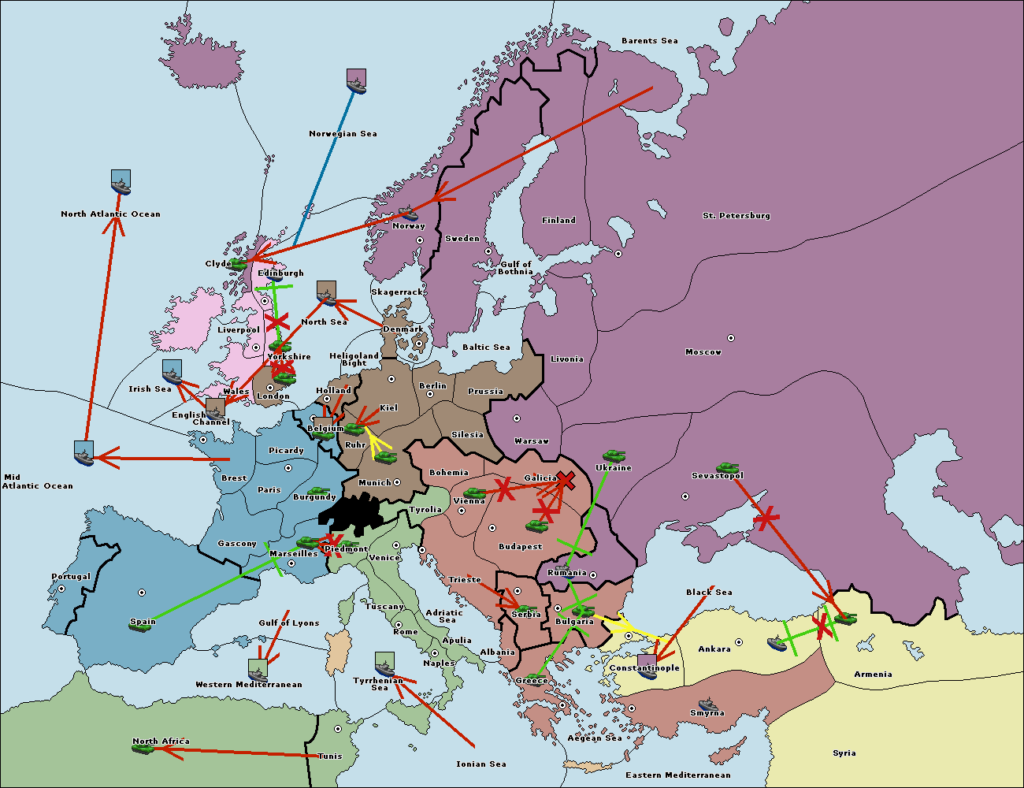
The board on Autumn 1903
I feel I should post a warning here, for those who might follow in my footsteps and place some sliver of trust in Germany.
Public Message from France, Autumn 1903
Germany and I shared a vision for the game which benefitted us both. We shared vast amounts of information, we coordinated on the board and in our diplomacy with third countries. We each took risks, and had our trust repayed. We planned for turns, for years, and for endgames. I am no novice, and I have rarely had such a convincing ally; and perhaps never been stabbed by one. Germany had two fairly equal routes for expansion here; and they have told me themselves that this was a narrow strategic decision. In the end, all the trust we had built was no more than a feather in those scales.
I have never met such an impressive liar. Do not trust Germany an inch. And if I can find a way to hurt their chances in this game, I will do it.
I’ve played a lot of Diplomacy, and I’ve recieved a lot of “screw you” messages. In all candor, this is probably my favorite.
During the match, the players’ names were anonymized; Teccles—a longtime fan of this blog!—did not necessarily know who he was addressing when he crafted that message. It’s really funny to me that, even now, Teccles is one of the site’s oldest Patreon Patrons.
Teccles, it is a delight to play Diplomacy with you, and I cherish your sponsorship of my work
Anyways, as Germany, I had simultaneously pursued very sincere-seeming alliances with France and Russia and Italy and Austria. Not only did I tell each power of my intentions to work with them for the long term (and to attack the others), but I sold them on that story. Up until I broke my promises, each of them pretty much chose all their moves consistent with an alliance with Germany.
And I had a great result that match:
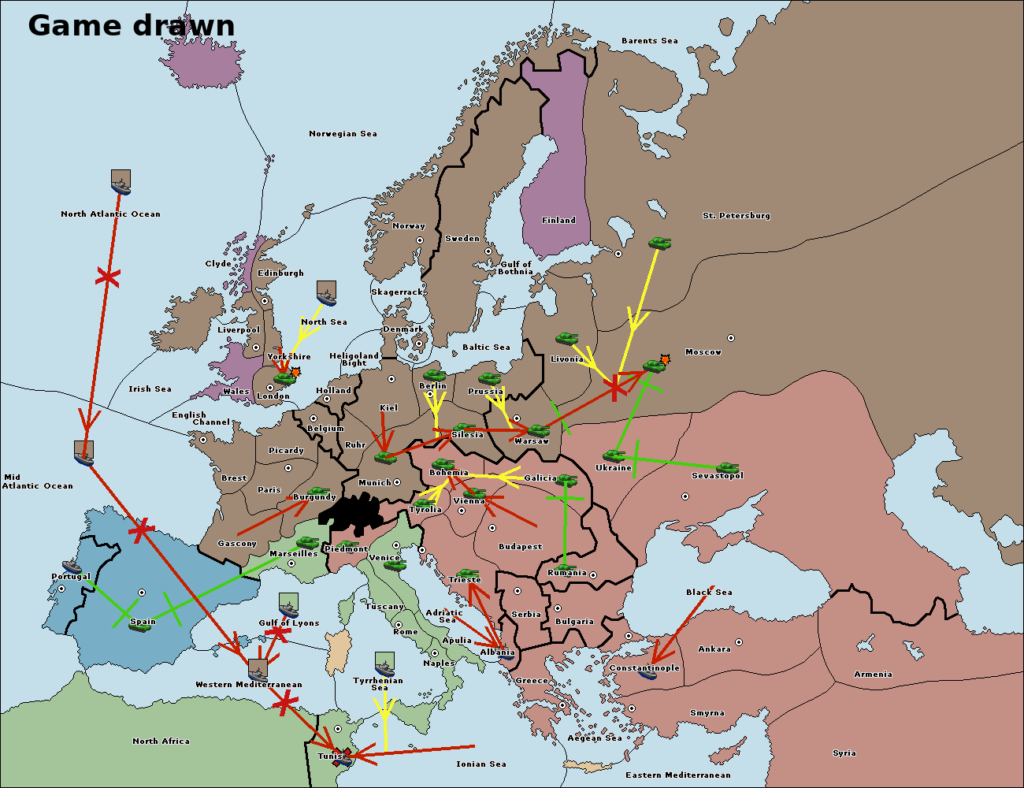
The final board on Autumn 1908
Teccles (France) did what he had to do, and later worked with me again to avoid elimination (but eventually did block my solo win—it was a close game!). In the tournament scoring system, my 16-center board top gave me a massive share of the points that was more than enough to advance to the next round, so my final outcome was pretty dang close to a “win.”[4]Still, I would rather have soloed. So Teccles did get some measure of revenge.
After the match, Teccles and I had a great conversation. Now that you have a bit of context, I’d like to share with you some of the highlights.[5]This conversation has been edited for grammar/clarity/readability whathaveyou, but basically these are quotations from a real conversation we had. I think our post-game discussion is as interesting and lucid as anything I could write up now. I’ll distill my those thoughts into pieces of advice:
1. Be Bold; Court Multiple Allies with Confidence and Charisma
You say that you had a relationship with Russia on a similar level to the one with me. I find it hard to manage more than one alliance of that kind, because I am not quite accomplished enough a liar—but also, I definitely worry that my various allies will talk, and discover that I have contradictory, deeply held strategies. Do you find that in practise, juggling allies in this way mostly works out fine?
Teccles / France
![]() Actually, yes.
Actually, yes.
Simply put: I have confidence in my ability to talk my way out of any situation where there isn’t smoking-gun evidence of my involvement (like my supporting “enemy” moves, or making moves that only make sense if I had advance knowledge of others’ intentions). Because when there’s no tactical proof that I was involved (or had something to do with it), it’s one player’s word against another’s. Because I have faith that my credibility/rapport/charisma (whatever you want to call it) will protect me from someone’s mere suspicion of a double-cross, I don’t restrict myself to forming a deep relationship with just one other player. I have faith that, so long as I don’t reveal my intentions with my moves, I can pull puppet strings without alienating the other players. And my faith in myself was well-placed for this match.
That’s very interesting. I worry about having too many contradictory plans, but I must make sure I try at least once to be bolder, and see how I fare.
Teccles / France
2. If Accused, Talk Your Way Out of It
One quick question on Italy: did you encourage them to attack me in 1902? If so—were you not worried about me hearing about that?
Teccles / France
![]() Oh yes I did encourage Italy to attack you in 1902. I was definitely worried, but I’m not averse to taking a risk, and in any event did what I could to mitigate the risk.
Oh yes I did encourage Italy to attack you in 1902. I was definitely worried, but I’m not averse to taking a risk, and in any event did what I could to mitigate the risk.
I explained (in advance) to Italy why it was so important for Italy not to tell you that I had encouraged them to attack you. I explained why it was in Italy’s interest to keep you in the dark about our alliance. I said that if you did not detect that I was involved in a plan with Italy to attack you, then our eventual joint attack upon you would be much more likely to succeed. (And, to be clear, this line of thinking I fed to Italy was absolutely true; later I was able to attack you successfully, with Italy, because Italy kept quiet.) Italy argued with me that it was better not to act coy about working together with me, but I persuaded them to play it my way.
Also, I easily talked my way out of Russia leaking to you that I suggested an anti-French move, did I not? Probably because it was just too hard to see how I would be involved in such a thing, yeah? It was one player’s word against another’s. I think I made up stuff that Russia had said weird lies to me to incite me to fight against you, right? I think I said something like that to discredit Russia. So although this isn’t exactly a reason why I told this Russia to do this, I created a situation where, if I talked my way out of Russia’s leak, perhaps you would find me more credible than Russia, even though I was the liar.
If I recall, I saw no value in pressing the point. It did affect my private thinking on you a little—I was not so sure of your line as I made out—but not in a way that ended up doing you any harm at all.
Teccles / France
3. Tell Everyone You are Lying to Everyone Else
![]() Internalize this idea: “It is far easier to fool a person than to convince that person that they have been fooled.”
Internalize this idea: “It is far easier to fool a person than to convince that person that they have been fooled.”
Write that on a sticky note and put it on your desk, and look at it a few times until it really sinks in.
Because people do not want to believe they have been fooled?
Teccles / France
![]() That’s right.
That’s right.
So look, in that match, I told you that you would be my ally 100% until the end. I also said that to Russia, Austria, and Italy. I would have said it to England or Turkey if it mattered.
A really common ploy for a tight alliance is to falsify an external diplomatic front that you aren’t really working together, and to use your diplomacy to weaken the defenses of the other powers.[6]This is arguably a type of Trojan Horse alliance.
To further that plan, there will almost always come a moment when one ally says to the other “Listen, I have so-and-so completely convinced that you and I aren’t working together. I’m going to stab them sooo bad; isn’t that awesome?” And if I’m saying this to multiple players, what could they say to each other that I haven’t already disclosed?
So Russia thinks my alliance with you is a ruse, and you think my teamwork with Russia is a ruse. No matter what happens, no matter who I backstabbed later on, each player would be able to believe that I must have been “telling the truth” all along. But the actual truth is that I didn’t particularly care, and made up my mind once the situation had fully unfolded.
When I backstabbed you, Italy sent me all sorts of celebratory messages. Our “long con” had “worked” and “paid off” and I was “telling the truth all along”—Italy was really going nuts when I finally did it.
Similarly, Austria and I had been planning for me to attack Russia since very early on, and was simply waiting and hoping for me to follow through. Austria was very happy when I attacked Russia, and didn’t immediately interpret my actions as a solo win attempt (since Austria was expecting me to help Austria finish off Russia.)
To pull off this kind of strategy, you need to figure out moves that are consistent with alliances with each player involved. It’s important to run ideas by each “ally” and see what they’ll agree to. Find a way to make moves that each player considers acceptable. One way to do this is to tell a player who dislikes your move is that the true purpose of the move is to deceive someone else. Some players love that kind of thing and will readily agree to it.
I see. So you can show two faces to different people. And when they compare notes, each will still believe that their face was true.
Teccles / France
![]() Correct.
Correct.
4. Develop Long-Term Alliances, then Spring them like a Trap
![]() So to give you complete advice on the topic of alliances: I advise you to maintain alliances with several powers, especially alliances that may matter down the road. It definitely mattered that I had been building this alliance with Austria in secret for years and years. I don’t know for sure, but I suspect that I had a strong influence in Austria threatening to attack Italy, and Austria might have done so if I let Austria have Moscow. Austria seemed like a crazy person, I bet, to the other powers. But everything I had done, and what we were doing, was consistent with an alliance we had agreed to for many years.
So to give you complete advice on the topic of alliances: I advise you to maintain alliances with several powers, especially alliances that may matter down the road. It definitely mattered that I had been building this alliance with Austria in secret for years and years. I don’t know for sure, but I suspect that I had a strong influence in Austria threatening to attack Italy, and Austria might have done so if I let Austria have Moscow. Austria seemed like a crazy person, I bet, to the other powers. But everything I had done, and what we were doing, was consistent with an alliance we had agreed to for many years.
Austria loved that I helped you defend against Italy and backstabbed Russia. Austria didn’t treat it like a solo win situation but rather as a piñata breaking open.
This is excellent advice. I shall try hard to follow it in my next game, and make several alliances with the potential to last the game. In my successful games, I have mostly only made one.
Teccles / France
![]() I’m glad you think this is good advice; I think it is too. I really need to collect my thoughts on this and write a thorough blog post so that lots of players can benefit.[7]I am astounded to ponder that I have so many dozens of unfinished articles, recordings, video scripts, etc. for this blog that even though publish new content multiple times per month for years and still have a 2-year backlog of unfinished ideas. I suppose I’m demonstrating my belief that … Continue reading A lot of players read my blog now and they seem to think it’s really upping their game.
I’m glad you think this is good advice; I think it is too. I really need to collect my thoughts on this and write a thorough blog post so that lots of players can benefit.[7]I am astounded to ponder that I have so many dozens of unfinished articles, recordings, video scripts, etc. for this blog that even though publish new content multiple times per month for years and still have a 2-year backlog of unfinished ideas. I suppose I’m demonstrating my belief that … Continue reading A lot of players read my blog now and they seem to think it’s really upping their game.
5. Use a Huge Volume of Press to Cover your Deceptions
In Your Bored Brother’s experience, most online Diplomacy players will estimate the sincerity of your alliance effort by the volume and detail of your communications with them. A hidden assumption of this attitude is that a player couldn’t possibly send a huge amount of thoughtful press to just anybody.
Thus, quantity of press becomes a quality unto itself. Send elaborate, far-sighted messages and your allies will infer you are telling them the truth. They simply evaluate your credibility based on how committed you appear.[8]And, for the record, this isn’t a bad heuristic; I myself estimate other players’ credibility this way. I just also exploit this heuristic to my gain![9]This heuristic is rather unfortunate for a player who gets distracted by real life and can’t commit that kind of attention to a match of Diplomacy; they may be disbelieved just due to their lack of attention. Truly, that’s a shame.
Let me phrase this another way: in Diplomacy, you can just buy credibility by sending engaging messages.
6. Play to your Diplomatic Strengths
“BrotherBored,” you may be thinking, “It’s easy for you to suggest sending a huge volume of messages! But what if I just can’t write that much?” To that I say: there’s no better time than now to start practicing. Forging multiple strong alliances is necessarily going to require sending more messages than maintaining just one alliance would.
But, of course, a large quantity of press isn’t the only method that can help you build credibility. Pay attention to your own successes and failures, and learn about other techniques for developing good relationships in Diplomacy.
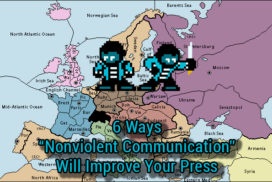

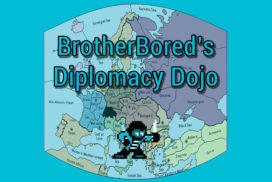
7. Remember that Duplicity is Part of the Fun!

Don’t let misplaced anxiety, guilt, or pride prevent you from having a good time and playing to win. Diplomacy has rules, but there’s no rule against overpromising your allies. Fear and shame should keep you from manipulating and lying to others in your everyday life (that’s a good thing!). But Diplomacy is a game, and the unusual social decorum surrounding the game is half the point of playing it.
Actors aren’t afraid to scream and shout at each other; Poker players don’t feel guilty about bluffing. The contest is what we’re here for, and employing a masterful, deceptive strategy creates the drama and excitement that keep Diplomacy players coming back.
Diplomacy players expect to be betrayed or manipulated (and if not…they should!). For many players, including Your Bored Brother, facing the challenge of a master diplomat is why we’re there to play. So the next time your everyday social feelings hold you back from trying something sneaky in Diplomacy, remind yourself that your rival players—though they may not admit it in the heat of a difficult moment—are playing Diplomacy precisely because they want to experience what you are about to do. Reassure yourself, and give them what they want!

By striving to play Diplomacy to the best of your ability, you are honoring your rivals and the spirit of competition.

Why Doesn’t Everyone Do it?
Yes, this technique is simple. Yes, using this technique will increase your greatly chances of winning. But despite the technique’s simplicity and value, few players employ it.
Why don’t more players do it? I can think of two obvious reasons:
1. This devious ploy is not terribly intuitive or obvious.
In other words, it’s hard to independently think of this plan. If you haven’t seen this technique used in one of your matches or read about it before, you probably wouldn’t think to try it. I, Your Bored Brother, have played in high-level tournament matches against experienced players who were surprised to find out that I had used this technique. More than one player has told me that it simply did not occur to them that a player could simultaneously pursue multiple deep alliances. Which leads to the second reason…
2. Building a deep relationship with another player takes a lot of work.
Building deep relationships with two players takes twice as much work. Three players, three times the work. And so on. Your typical diplomacy player lacks the resources (like time and energy) needed to effectuate a plan like this. Pursuing this technique requires you to dig deep into your well of motivation…and some players don’t want to win Diplomacy quite as badly as others do!
On a fundamental level, what it takes to win often in Diplomacy is no different than what it takes to win any other competitive activity. Learn from others. Dedicate yourself to winning. Gradually, you will improve.
And come back to this blog for more tips! I publish content frequently.
Wait! How do I counter this!?
For my parting thoughts, I’ll leave you some advice for how to counter a player who makes friends, then chooses enemies. Although I said that this is difficult to counter, I didn’t say it was impossible…

- Don’t put all your effort into just one alliance. If that ally turns out to have more friends than you do, you could be in trouble later on.
- Find out how chatty players are. If your ally is talking to other players as much as they are talking to you, you’re nothing special.
- Know that an engaging player is probably a good player. Strong diplomats, experienced players, they tend to know they can catch more flies with honey than vinegar. Be wary of an engaging ally; ironically, the quality of their conversation with you implies that they may be especially threatening.
And with that, I’m done!
I’d love to get your feedback! Contact me any way you see fit: the comments section below, the Contact page, Patreon, Twitter, Discord[10]If you are my Patron, you should have been automatically granted access to my Discord server., email[11]brotherbored@gmail.com—whatever works for you! I am eager to hear from my fans.
Footnotes
| ↑1 | Germany’s unique position of having 5 neighbors gives Germany both the incentive and the means to look for multiple overlapping alliances. |
|---|---|
| ↑2 | I use scare quotes here because I have cautioned against thinking of your rivals as truly “allied” to you just because they are cooperating with you. |
| ↑3 | I feel weird that, more than two years after the tournament started, I am still writing about the 2019 Online Diplomacy Championship. I suppose that because I put such a tremendous effort into succeeding, and because that tournament lasted for over a year, it’ll take me a longer time yet to reveal all the techniques I used and ideas I learned. |
| ↑4 | Still, I would rather have soloed. So Teccles did get some measure of revenge. |
| ↑5 | This conversation has been edited for grammar/clarity/readability whathaveyou, but basically these are quotations from a real conversation we had. |
| ↑6 | This is arguably a type of Trojan Horse alliance. |
| ↑7 | I am astounded to ponder that I have so many dozens of unfinished articles, recordings, video scripts, etc. for this blog that even though publish new content multiple times per month for years and still have a 2-year backlog of unfinished ideas. I suppose I’m demonstrating my belief that Diplomacy is a game with a limitless skill curve, if there’s really that much to say about it! |
| ↑8 | And, for the record, this isn’t a bad heuristic; I myself estimate other players’ credibility this way. I just also exploit this heuristic to my gain! |
| ↑9 | This heuristic is rather unfortunate for a player who gets distracted by real life and can’t commit that kind of attention to a match of Diplomacy; they may be disbelieved just due to their lack of attention. Truly, that’s a shame. |
| ↑10 | If you are my Patron, you should have been automatically granted access to my Discord server. |
| ↑11 | brotherbored@gmail.com |


Wow, this article is fascinating. I’ve always found it highly annoying when I found out my ally was also working against me with others WHILE working with me. But this article puts those actions in a whole new perspective in regards to what top players are actually trying to do, which is form deep alliances with everyone. And that I should be doing more of those same things myself!